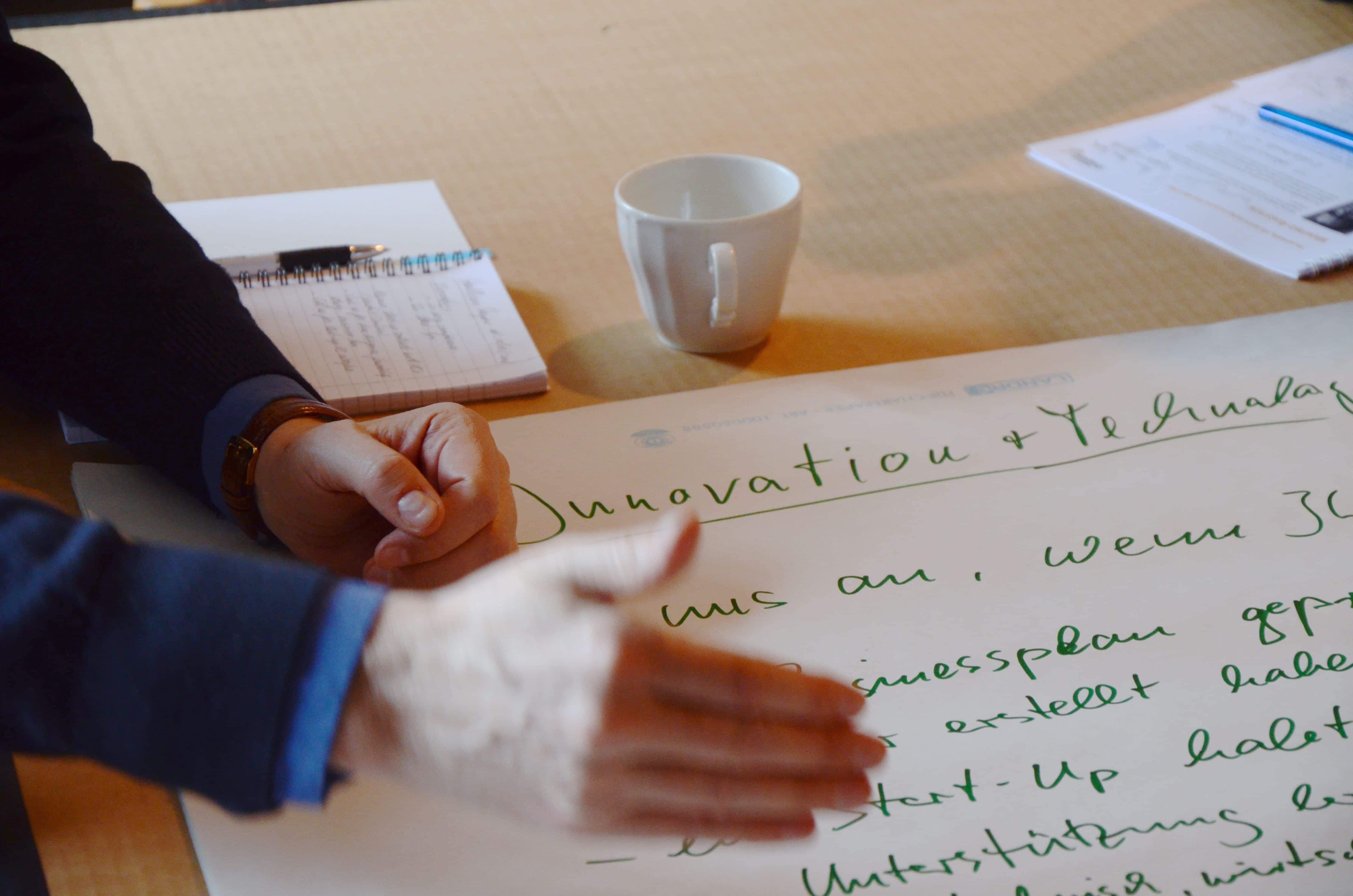Sustainability
Sustainable management, for centuries a basis for humans in their interaction with nature, is once again gaining greater importance in the management of companies. Holistically conceived solutions to compelling problems in day-to-day business and sustainability efforts can be synergistically reinforced and contribute to the economic success of companies.
Challenges: The spectrum of multi-faceted challenges in the coming years is diverse: how can sustainability information from supply chains be tapped, how can the growing number of public sector financing options be used? What needs to be done to make production and logistics processes economically attractive and climate-friendly? How can companies obtain the right sector- and industry-relevant certifications?
With the Corporate Sustainability Reporting Directive (CSRD), the legislator provides a concrete framework of requirements for the sustainability issues that companies must address.
Outlook: Assessing companies in terms of ESG (environmental, social, governance) criteria as part of the CSRD is a step toward greater transparency. For companies, this already has a variety of consequences:
- Customers select their product purchases on the basis of relevant sustainability criteria/labels/certificates for the respective market sector - in this way, "completely" new supplier and cooperation constellations can arise.
- Banks also link the granting of loans to the development of non-financial key figures (which are audited and available in the annual financial statements).
- Corporate competition is significantly fueled by digitally supported, intelligently implemented, sustainable process adjustments in R&D, production and logistics.
Sustainability issues present companies with challenges that are dynamically changing, complex and require active action. Doing nothing effectively means taking a step backwards.
The Healthcare Shapers support companies in activating their largely untapped sustainability potential, anchoring it in sustainability strategies, and positioning themselves more risk-resistant.
Extract from the range of services:
- Creating transparency with regard to emissions along supply chains and own production processes.
- Development of strategic sustainability and digitalization approaches for climate-friendly/neutral R&D, logistics and production in pharmaceuticals, chemicals, medtech and life sciences
- Implementation support up to the establishment of processes and procedures on a technical/physical/chemical level
- Utilization of waste materials for the synthesis of sustainable chemical feedstocks and fuels (e-fuels)
- Digital monitoring of supply chains and risks
- Determination of CO2 balance / ecological footprint
- ESG analysis for companies (reporting & optimization potential)
- Sustainability coaching for decision makers and implementation managers
- Targeted transformation through active change management
- Support for the establishment of sustainability management structures (organization, processes, systems, qualifications)
In doing so, we provide selective and individual support to enable sustainable success.
Blog & Case Studies
Your Experts
Definitions & Terminology
The Non-Financial Reporting Directive (NFRD) defines the disclosure obligations of companies. The Corporate Sustainability Reporting Directive (CSRD) replaces the NFRD. The rules introduced by the Non-Financial Reporting Directive (NFRD) will remain in force until companies have to apply the new rules of the CSRD. Under the NFRD, large companies will have to publish information on the following topics
- Environmental issues
- Social issues and the treatment of employees
- respect for human rights
- anti-corruption and bribery
- Diversity on company boards (in terms of age, gender, educational and professional background).
These reporting requirements apply to large public interest companies with more than 500 employees. This covers approximately 11,700 large companies and groups in the EU.
The CSRD significantly expands existing rules on non-financial reporting (NFRD). All companies listed on an EU-regulated market (with the exception of micro-entities) are covered by the new reporting obligation (from 250 employees, a balance sheet total of more than 20 million euros and sales of more than 40 million euros - two of the three characteristics must be met).
The new CSR Directive follows a double materiality perspective. This means that companies must record the effect of sustainability aspects on the economic situation of the company. And they must clarify the impact of operations on sustainability aspects. The CSRD requires reporting in standardized form (ESRS) to include information on:
- Sustainability goals,
- the role of the management board and supervisory board,
- the main adverse impacts of the company and
- intangible resources not yet recognized in the balance sheet.
In order to introduce binding EU guidelines for non-financial reporting, the EU is striving for uniform reporting standards. Specific sustainability-related disclosures that will be subject to mandatory reporting in the future are being developed by the European Financial Reporting Advisory Group (EFRAG).
The Corporate Sustainability Reporting Directive (CSRD) provides the requirements for non-financial reporting, while the European Sustainability Reporting Standards (ESRS) define the content.
Source: Frank Roth
The 2030 Agenda for Sustainable Development, adopted by all United Nations member states in 2015, is a shared blueprint for peace and prosperity for people and the planet, now and in the future. At its core are the 17 Sustainable Development Goals (SDGs), which represent an urgent call to action by all countries - developed and developing - in a global partnership. They recognize that eradicating poverty and other deprivations must go hand in hand with strategies to improve health and education, reduce inequality, and spur economic growth - all while combating climate change and working to protect our oceans and forests.
The 17 SDGs are integrated - recognizing that action in one area affects outcomes in others and that development must balance social, economic and environmental sustainability.
Science Based Targets (SBTs) show companies how much and how fast they need to reduce their greenhouse gas emissions to avoid the worst impacts of climate change, and guide them on a clear path to decarbonization. By guiding companies in setting science-based targets, SBTi enables them to address climate change while reaping the benefits and increasing their competitiveness in the transition to a net-zero economy.
More than a thousand organizations around the world are leading the way for zero-carbon transformation by setting emissions reduction targets based on climate science through the Science Based Targets Initiative (SBTi).
ESG assesses a company's ability to create long-term value in a rapidly changing world. ESG is a framework that helps stakeholders understand how an organization manages risks and opportunities related to sustainability issues. ESG takes the holistic view that sustainability encompasses more than just environmental issues. Although the term ESG is often used in the context of investments, stakeholders include not only the investment community, but also customers, suppliers, and employees, all of whom are increasingly interested in how sustainably a company operates.
CSR and ESG are often used synonymously, but differ relevantly in their approaches. While corporate social responsibility (CSR) refers more qualitatively to corporate responsibility ("doing good - avoiding bad", avoiding misconduct in the company along the value chain), the environment, social, governance (ESG) concept focuses more on making the respective corporate efforts measurable in terms of environmental, social and aspects of corporate governance.
Source: Frank Roth
The individual emission values that are included in the CO2 balance.By analyzing the emission inputs of processes and products, reduction potentials can be determined and potential realization measures can be derived within the framework of sustainability management.
Source: Frank Roth
The carbon balance (or footprint) is the quantification of greenhouse gases caused by the activities of companies or organizations.This carbon footprint is a measure of the total amount of carbon dioxide emissions that are directly or indirectly caused by the activities of products (companies, logistics, transport, cargo) or people. The footprint can be expressed as pure CO2 or CO2 equivalents.
The concept of resource efficiency/sustainability coaching is to empower you as a company or individual to develop a sustainable strategy that works for you.
It finds its application in the corporate context increasingly in the areas of energy efficiency as well as supply chains and production (optimizing consumption of fuels, heating/cooling, packaging materials, chemical base materials, etc. and switching to sustainable alternatives).
Source: Frank Roth
Sustainability management describes the integration of concepts and instruments for improving social, ecological and economic aspects into organizational management. Effective sustainability management ensures the long-term success of companies.
Core elements of a comprehensive sustainability management are environmental management, quality management, risk management, the perception of employee concerns, the socially and environmentally compatible alignment of the supply chain, operational information systems and the fight against corruption.
The collective term e-fuels refers to all types of fuels that are produced synthetically using renewable energies. What distinguishes them from conventional fuels, therefore, is that they are not of mineral origin and do not consume finite resources such as petroleum.
Synthetic fuels that rely on hydrogen as a base product have the advantage that hydrogen is almost infinitely available in nature and can be produced in a largely climate-neutral manner. Since hydrogen is released by electrolysis of water with the help of (renewable!) electricity, the products are "electricity-based fuels" and are referred to as e-fuels or power-to-X.







